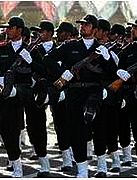IRGC Members Should Run for Majlis
» Khamenei’s Rep Declaration:
As the number of former IRGC (Revolutionary Guards) members in the Majlis has been growing since they first entered the body in 2005 and took over key committees, this week the representative of ayatollah Khamenei in the force called on for more members of the force to get into the consultative assembly so that they could, in his words, “take strong and focused positions on important decisions.”
Speaking a day after his press conference on the forthcoming elections in March, Cleric Ali Saeedi said, “There is no legal problem with the presence of members of the armed forces or those in the intelligence agencies, and as provided by law of commanders and other members of the armed forces in the Majlis after their resignations from their positions and membership in the IRGC.”
“In view of the need to have specialists in the Majlis, including areas of defense-security … members of the armed forces that have expertise in military affairs too can become candidates for the assembly,” he said.
Saeedi said that the nature of the work that IRGC members performed was similar to that of Majlis representatives and added, “The Guards and Majlis representatives defend the revolution in different ways. Therefore, defense activities can continue in the Majlis in the same fashion after membership in the IRGC is terminated.”
In explaining his interpretation of work in the IRGC he said that strict military work had no meaning and that members of the force were “revolutionaries” and “enthusiastic” individuals who wanted to impact and defend the revolution and its accomplishments, adding that their mission was different from those in the regular armed forces. “Their participation in the Majlis elections was a form of defense of the fortifications of the revolution.”
Former IRGC commanders already hold some key positions in the Majlis among which are Mohammad Kowsari, Parviz Soroori, Mohammad Karamirad, Gholamreza Karami, seyed Ahmad Avai, and Aziz Akabarian. A significant number of the majority faction of the Majlis – i.e., the Principlists – is also made up individuals affiliated to the IRGC, the Basij official vigilantes and security agencies.
While the deadline that the ministry of the interior set for public figures to resign from their positions if they intended to register to run for the Majlis has already passed, the IRGC public relations office has till today not announced the names of any of its members who may have submitted their resignations for this purpose. Some media closely associated with Ahmadinejad’s administration have however published reports about the resignation of some IRGC members in order to run for the March elections.
The only IRGC official to have officially resigned from his post is cleric Mojtaba Zolnoor who is ayatollah Khamenei is deputy representative in the force. At the time of his resignation he announced that he would be retiring because he intended to run for the Majlis. Soon after that, general Ramezan Sharif, the PR official in the IRGC announced his acceptance of Zolnoor’s resignation.
The participation of IRGC officers in elections and their direct candidacy in the last presidential voting is viewed by many to be contrary to the express views of ayatollah Khomeini, the founder of the Islamic regime, who had said that “military institutions are barred from engaging in political affairs.” In his political will too he expressly said that members of the armed forces to which he also included the Basij, the police and others, should under no circumstances enter “political games.”
The constitution of the Islamic republic also stresses the same principle. The Penal Code for the Armed Forces of Iran also bars members of the armed forces from engaging in political activity.
But despite such legal provisions and statements, IRGC members have run in various parliamentary and presidential elections. Last summer, IRGC general Yadollah Javani, the former head of the IRGC’s Political Office who had resigned from his post the month before, stressed on ayatollah Khamenei’s satisfaction of the performance of the force in recent years and particularly its involvement in the political affairs of the country and had said, “Some had thought that the Guard are merely a military institution and that it was like the army. Some political groups too had made the same interpretations for their own purpose and had tried to present the force as a purely military one and denounce its activities in other areas. But contrary to this view, the IRGC is a revolutionary institution, as defined and described by the constitution, the charter of the IRGC and the orders and guidance of ayatollah Khomeini, and the remarks of the supreme leader. Its principle mission is the defense of Islam, the Islamic revolution, and its accomplishments. This institution must be able to defend the revolution and its accomplishments ‘under any conditions’ and provide assistance to the direction of the revolution in accomplishing its goals and ideals.”
This former head of the IRGC’s political office had referenced ayatollah Khamenei’s remarks to stress that the work of the force was not limited to military affairs but included political, military, cultural and security domains as well.
In September/October of this year, the commander of the IRGC Mohammad Ali Jaafari too said that the scope of IRGC remained unlimited. “Just as the supreme leader does not define any restrictions on the IRGC to perform its mission in its defense of the Islamic revolution, the force must be ready to defend the revolution and its achievements in all fields,” he said.
He referenced the force as “the arms of the leader” and said that the IRGC was no longer just the military arm of the leader but that it was also his non-military arm. “Defense of the revolution is a fluid phenomenon that is continuously growing which requires the force to be ready in all political, cultural and ideological spheres,” he said.


